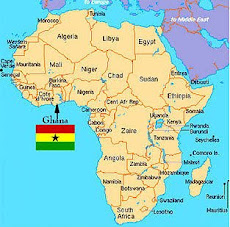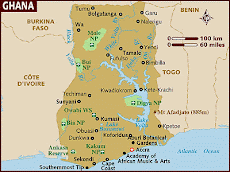We have no idea how many people are reading the blog. However, from emails received we realise that there are quite a few people following our experiences here in Ghana. We really do appreciate the comments and kind words we have received, so thank you so much for that.
This blog entry may not be up to our normal standard, as our trusted Lumix camera decided to die on us on Christmas Eve. We do have a large Nikon with us, but it is a little difficult to avoid looking like a tourist or journalist with that slung over the shoulder. Ghanaians are justifiably a little suspicious of journalists – especially when they photograph broken down buses and the like!
Our Christmas present to each other was a few days at a lovely hotel in Kumasi. We had hot showers, buffet breakfasts, a swimming pool and even a haircut.
Kumasi is the capital of the Ashanti region. The Ashanti people are probably best known for their victories in battle against the British colonists in the nineteenth century. Kumasi is a very interesting and friendly city. We particularly enjoyed time at the cultural centre talking to, and buying from, a range of artisans. We bought a couple of presents in readiness for the secret Santa event planned for Christmas Day with other VSO volunteers. One was from the wood carver pictured below.

We toured the museum where the traditions surrounding the Ashanti Kings were explained to us. We ate at a restaurant called the Kentish restaurant. The very popular traditional woven cloth from the region is called Kente cloth and we, of course, thought “Kentish” was something to do with that. However, we met the owner and found that she had lived in London in Kentish Town. (She had also lived in Walthamstow, a stone’s throw from our own home!) The pictures below show the hive of activity around the market and tro-tro station in central Kumasi.

After spending a delightful time in Kumasi we set off to join 15 other volunteers in Koforidua, the capital of the Eastern region. This was our first trouble-free bus trip, where we were able to view the ever greener countryside. We have now left the dry, dusty savannah of the north and are in the midst of palms, banana trees, hibiscus, crotons and other tropical flowering plants. Even the football fields are green.
Christmas Eve was spent at a bead market, which is renowned throughout West Africa. In the evening we enjoyed a carnival in town with our VSO friends - lots of very loud music and lively dancing.
Christmas Day started with a swim in the hotel pool. We then headed off to join our friends again for a barbecue. We marvelled at the teamwork and enterprise that enabled 17 of us to sit down together for a veritable feast.


As always, we were joined by several of the local children, who tried to teach a few of us how to speak the local language, Twi.
On Boxing Day, we all piled into one tro-tro and were taken on a trip out into the countryside. It was extremely sobering to have the opportunity to visit a local gold mine, with workers extracting tiny pieces of gold from the mud. The conditions of the workers were awful. Having very recently watched the film, Blood Diamond, it was all so reminiscent of the conditions in the diamond mines in neighbouring Sierra Leone.


We then had a hot, steamy, delightful walk through tropical jungle, in order to reach a waterfall.
It is the dry season, so we eventually arrived at a no-water, waterfall! However, the scenery and plant and animal life were awe-inspiring and we had a great picnic of leftovers from Christmas day. 
Today, Sunday, we travelled to Accra and have toured the main sites and museums. We were really interested to learn about Nkrumah’s life and Pan African aims. We saw our first examples of colonial forts and slave dungeons. Our Ghanaian guide had an amazing perspective on slavery i.e. some aspects of slavery are very positive, because the descendents of slaves are now in Europe and America, and therefore they are able to send money and support back to Ghana to aid its development – so that’s alright then!!
One particular display shows a series of pictures of the first presidents of African countries, taken as the country gained independence from colonial powers.
The president’s palace in Accra is currently the centre of a major controversy. The new government has many socialist aims. In line with this, there is a plan to use the palace and its grounds for breeding chickens, “as there are so many hungry people in Ghana”. Meanwhile, it stands uninhabited and unused ....so watch this space.











































